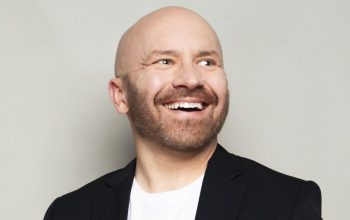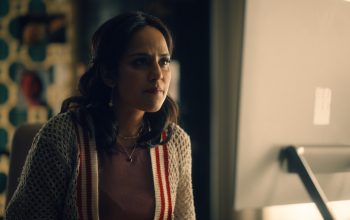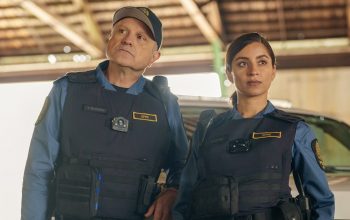Our final interview before tonight’s Fear the Walking Dead premiere is with Frank Dillane (Nick), and Creator/Executive Producer Dave Erickson. You’ll meet Nick in the first few minutes of tonight’s episode, which is the start of an intriguing new story set within the world of The Walking Dead.
What are you able to tell us about the world of Fear the Walking Dead?
Dave Erickson: I worked with Robert [Kirkman], wrote the pilot years ago, and we stayed in contact. When he decided he wanted to do a companion series, I got lucky. We sat down and we began to talk. He knew he wanted it to be in Los Angeles, not just because we live in Los Angeles and it was convenient for our families, but because he wanted something that was distinctly different from Georgia. He wanted a backdrop that was massive and sprawling, and you definitely get that in LA. The question for us was how do we justify it creatively? How do we justify it dramatically?
Los Angeles is really, for me, a place of reinvention. It’s a place where people’s identities shift, and that format is something that sort of threads throughout most of our characters. Many of our characters [have] come to California on their way many to escape their past and bury sins. Some of our characters have committed crimes, or they’ve had crimes done to them. It becomes this interesting stew where in order to survive in this new world, some of them are going to have regress and go back to who they were, as opposed to simply growing and surviving and learning how to grapple with the apocalypse.
It felt like a very good fit where the city itself intersected well with the characters. Then, we just started writing. Robert is a great collaborator, and I told him if I was going to do it, I needed to inject something of myself into it. So there is a very dysfunctional blended family at the heart of the show, which bares no resemblance to my own (laughs).
First and foremost, we had this opportunity where we’re living in Season 1 — and potentially in Season 2 — in this space and time were Rick was in his coma. We have the opportunity to see the fall. We saw Atlanta at the end of the pilot of the original show and you saw the area belonged to the dead. The idea of being able to watch the steps, through the filter of our family and see that fall happen, was appealing to Robert and myself. To see the education that these characters have to go through in order to learn and understand what’s actually happening.
The other thing that Robert brought to the table was he wanted to have a better understanding of what it means to do violence to someone else, especially in our world where Greg Nicotero has done wonderful work with our infected, our walkers. But they’re not at the place right now where they’ve assumed the monstrous, horrific look. They don’t look like monsters yet. When you’re confronted by somebody who a day you ago, you had coffee with — a colleague, a friend, or family member — and you’re forced to defend yourself or defend somebody you love and commit a violent act, it takes a toll, an emotional and then psychological toll. He was very keen trying to explore what that would be like. If someone is behaving that way, you don’t go and grab a bomb and a gun. You want to try to understand and help. You want to call 911. You want to try to reach them. You don’t understand why they’re not responding. It’s this really emotional, dramatic conflict that I found fascinating, and it’s something we’ve had the opportunity to look into.
Most films in the genre go from zero to apocalypse in the first reel because you have to get caught up and be able to defend yourself. For us, part of it is the psychological tension and emotional trauma of trying to understand [the circumstances] and protect your family. Because we’re starting from this bed of a family drama, they already have problems when we start the show. Frank’s character has problems up to his eyeballs. A lot of the characters are in a bad way, and it’s the simplest things, like two people with their respective families falling in love, trying to bring everybody under one roof and all of the bullshit that goes with that. The irony is that ultimately the only way these families do come together into this one blended family is because of the apocalypse.
With Fear the Walking Dead being a family drama at its heart, do you think it will attract viewers who wouldn’t watch The Walking Dead?
Erickson: I say this with absolutely no arrogance — yes. We are living under the same mythological umbrella. We have to follow the same rules that are established in the original show in terms of the walkers and how they turn and when they turn and how you kill them. But there are certain things we will never do. We’re not going to [say] there’s no cure. They’ll never know how it happened. It’s living within the world of these families.
We start with this family that already has enough drama to deal with and make the problems and those conflicts the story and then, we layer [the apocalypse] in. Robert said to me early on [that] this is the show: your parents just got divorced … oh, there’s zombies; or you didn’t get asked to the prom … oh, there’s zombies. They do that in the comic and he does that on the original show, but I think we have an opportunity to really steep ourselves in that idea. All of the trials and tribulations that were established in the pilot for our characters, those are the stories that we’re going to tell.
Was there a specific moment when Nick came alive for you, Frank?
Frank Dillane: When auditioning for this it [was] very secretive. I didn’t get sides of anything.
Erickson: It was all a different name.
Dillane: It’s very interesting working from a place where you don’t know where your character is going or what’s going to happen. I still don’t know what’s going to happen or where’s he’s going or anything like that. But, I remember getting into costume. It was very important for me. I remember putting on a shirt — and really, it was such an ugly shirt — and I think that was the moment where something seemed to click.
Frank, what are the challenges in playing a character like Nick?
Dillane: I think the main trouble for me when playing any character is you want to do these people justice. It’s always a fear to put personal fears in actors that you’re fraud or you’re a liar. So when you’re playing someone who has troubles or anyone, really, you just want to make sure that you are doing him justice. That’s always my biggest concern, because I don’t want to be a fraud.
Photo by RHS Photo. Courtesy of AMC Global.


